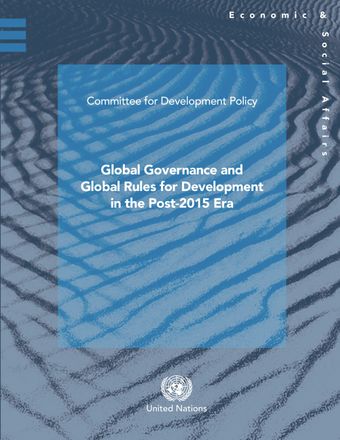Summary

- Author: United Nations
- Main Title: Global governance and global rules for development in the post-2015 era , pp 6-8
- Publication Date: July 2014
- DOI: https://doi.org/10.18356/c0a289e2-en
- Language: English
Intergovernmental cooperation is at the centre of the global partnership for development. It has a vital role to play in the achievement of global development goals, in terms not only of the resources and technical assistance it can provide, but also in the areas of policy decision-making and norm-setting. Global governance encompasses the totality of institutions, policies, norms, procedures and initiatives through which States and their citizens try to bring more predictability, stability and order to their responses to transnational challenges. Effective global governance can only be achieved with effective international cooperation. Neither the existing proposals to strengthen global governance nor the global rules to support development are fully satisfactory; they have also not received sufficient attention by the intergovernmental processes addressing the development agenda for the post-2015 era. This Note presents comprehensive yet practical recommendations on how international cooperation, through its various institutions, arrangements and rules, could be reformed and strengthened to achieve and sustain development gains beyond post-2015.
© United Nations
ISBN (PDF):
9789210567695
Book DOI:
https://doi.org/10.18356/914e7262-en
Related Subject(s):
Economic and Social Development
Sustainable Development Goals:
-
From This Site
/content/books/9789210567695c003dcterms_title,dcterms_subject,pub_keyword-contentType:Journal -contentType:Contributor -contentType:Concept -contentType:Institution105
/content/books/9789210567695c003
dcterms_title,dcterms_subject,pub_keyword
-contentType:Journal -contentType:Contributor -contentType:Concept -contentType:Institution
10
5

